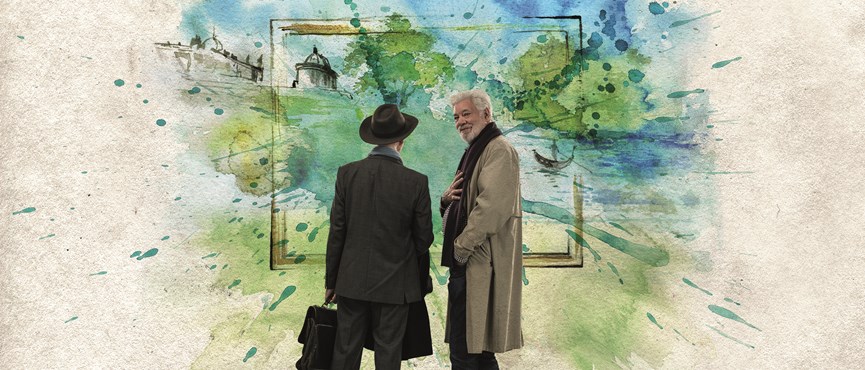Centred around a meeting between the poet WH Auden and composer Benjamin Brittan in the halls of Oxford University, ‘The Habit of Art’ weaves seamlessly between humour and lines that come straight from the souls of the muses. Auden argues that “Poetry gives voice to the inarticulate Universe” while Britten passionately says that “Music melts words.” Glistening with poetry, song music, philosophy and an outstanding cast including Matthew Kelly as Auden, and David Yelland as Britten, anyone who sees this play will leave feeling nourished. Only a writer as gifted as Alan Bennett could weave such elements of raw humanity and high art together so seamlessly, leaving the play rippling in our subconscious long after we have left the theatre.
It takes the structure of a play within a play – art imitating life, leaving the audience gripped from the start. We are constantly reminded of the ‘Stop all the clocks’ line from Auden’s ‘Funeral Blues.’ The personification of the clock by Veronica Roberts was outstanding and Matthew Kelly’s incredible portrayal of Auden timing his meetings with the Rent boy at exactly 12 o’clock was in equal parts hilarious and moving. Auden was continually trying to ‘stop time’ to no avail. The fragility of the human condition and the fact that, in reality, we are unable to control life’s inevitabilities such as age, time, sexuality and death is delicately portrayed with pathos and dark humour. As Auden said in ‘Autumn Song, “the leaves are falling fast,’ which invites us to ask – who is really control of one’s persona?
In this play there are several factors controlling the protagonists’ image; the Biographer, played brilliantly by John Wark, creates their image on the page, whist the Director, played by Veronica Roberts, shapes their persona on stage. The assistant stage manager continually puts words into the mouth of the actor playing Auden. This is such a clever device which illustrates the fact that the image of the person that we see is not always accurate or autonomous.
In the same way that history canonizes ‘heroes’ and biographers frame their subjects in a certain light, this play is reframing our view of National Treasures, Auden and Britten. It is interesting how history whitewashes the darker sides of our heroes’ lives. It is so refreshing to see their flaws laid out in their raw glory. It doesn’t, in any way, take away from their genius as artists.
This play is profoundly beautiful and moving because it shows how their human fragility and exquisite minds can co-exist. One of the key questions is asked by the Rent Boy, not by those buried in the ground of Westminster Cathedral. He asks – what about everyone else? “Who will write our story?” In this age of Facebook and social media, where our true selves are framed, filtered and cleansed, maybe a play like this is more important than ever. 5 stars









